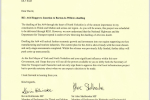Today I am appealing to members of the public to express their views about the Boundary Commissions proposals, which would mean Easingwold and its surrounding villages are no longer part of the Thirsk and Malton constituency.
The Boundary Commission for England released their proposals in June. The initial changes altered the boundaries of Thirsk and Malton quite significantly. It would mean that Thirsk and Malton would gain Bedale and Tanfield but lose Easingwold and surrounding villages including Huby, Raskelf and Husthwaite. Instead this area would become part of a new Wetherby and Easingwold seat which would extend over 20 miles from Leeds to the north of York.
In my view this makes no sense from a geographical perspective. The Easingwold area is an integral part of North Yorkshire and Wetherby is in West Yorkshire and run by a totally different local authority. Easingwold and Wetherby are separated by the A1 and have little in common. I think it would inevitably lead to less efficient and possibly more expensive services and, worse, Easingwold would become the poor relation to Wetherby. I hope that my constituents will look closely at the proposals and make their views known in the consultation process. I have lived in and love the Easingwold area all my life and it is a great privilege to represent it and desperately want to continue to do so.
I will be putting forward alternative proposals with my Conservative parliamentary colleagues which would keep Easingwold as part of Thirsk and Malton. I want to urge constituents to take part in the consultation process which is open until August 2nd.
The Boundary Commission proposals can be found here https://www.bcereviews.org.uk/node/6491 and comments can be made by pressing ‘make a comment’ then clicking on the relevant area of the map.
The 2023 Review of Parliamentary Constituencies was formally launched in January this year. The Commission is required to ensure that the number of electors in each constituency is more equal. This means that the number of constituencies in England will increase from 533 to 543 but the overall number across the UK will remain at 650. The Commission is undertaking an independent review of all constituency boundaries in England and will present its final recommendations to Parliament by July 2023.

